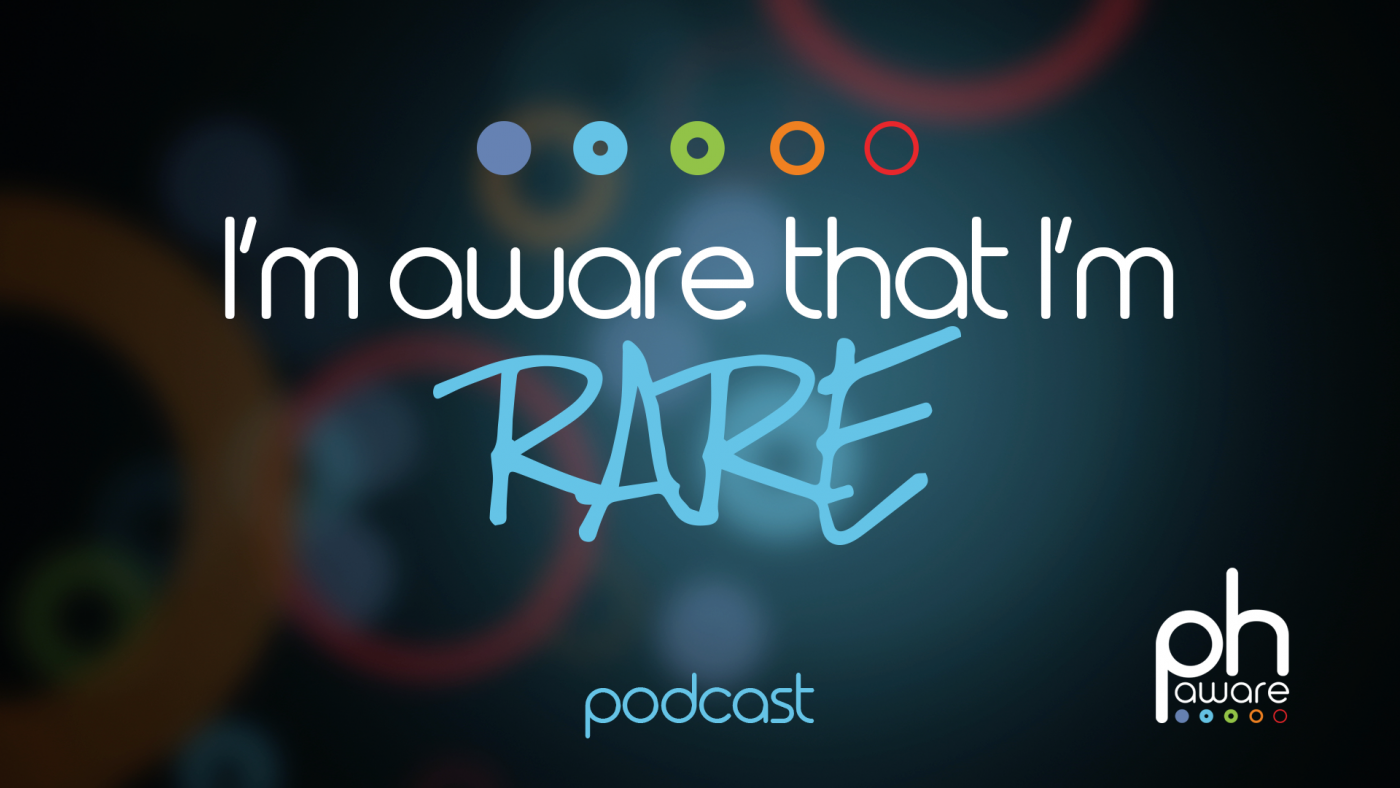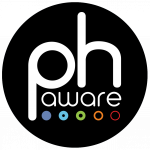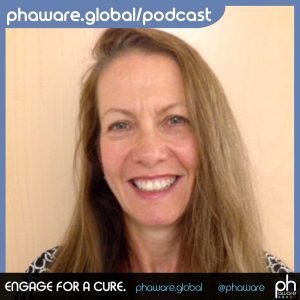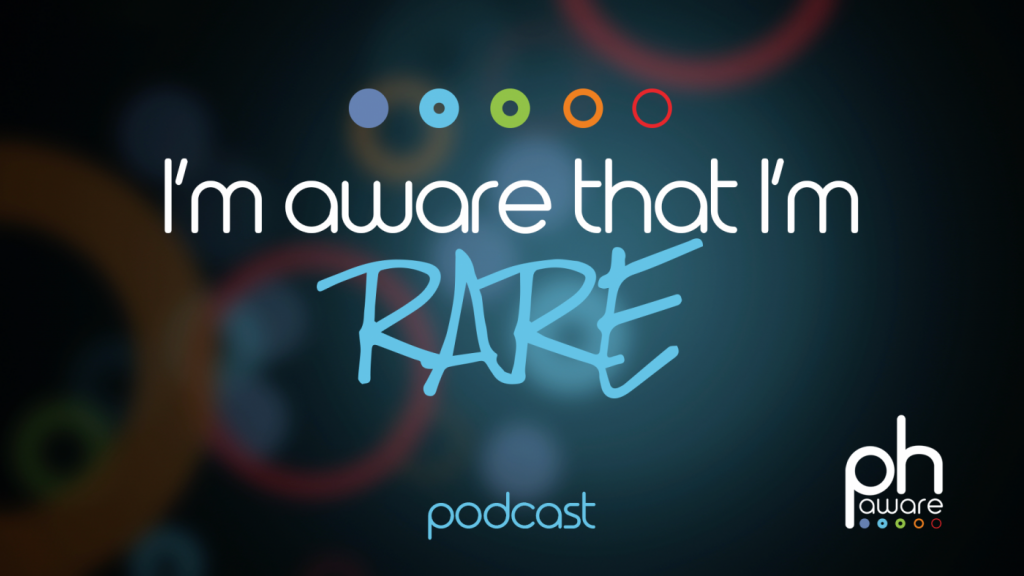Phaware Podcast: Abby Poms, Clinical Researcher

This podcast series, created and produced by phaware, is being offered as a regular guest feature on Pulmonary Hypertension News to bring the voices and life experiences of PH patients, family members, caregivers, healthcare specialists, and others to our readers. You may listen to the podcast directly, or read it via the transcript that runs below.
I’m Aware That I’m Rare: Abby Poms, RRT, CCRP
The phaware™ interview
Abby Poms is a Respiratory Care Practitioner and Certified Clinical Research Professional with more than 25 years of experience working in the field of pulmonary hypertension. She served as manager of the Duke University Pulmonary Vascular Disease Center, overseeing the pulmonary hypertension research programs and clinical care of patients. Over the course of her career she has mentored many clinicians in the pulmonary hypertension field and developed programs for patient education, advocacy and physician awareness. In this episode Abby discusses the different phases of a clinical trial.
My name is Abby Poms and I am a registered respiratory therapist and a certified clinical research professional.
I started my career in pulmonary hypertension with Dr. Vic Tapson, in the early ’90s, out of a lung transplant program. We ran the  epoprostenol trials in the early 1990s. There [were] no medications available for patients with pulmonary hypertension unless they could get a lung transplant. That’s how we got into the field. Once we realized that the drug worked, we could open up the doors and start treating patients with this medication.
epoprostenol trials in the early 1990s. There [were] no medications available for patients with pulmonary hypertension unless they could get a lung transplant. That’s how we got into the field. Once we realized that the drug worked, we could open up the doors and start treating patients with this medication.
Over the years, we pretty much got involved in all of the clinical research studies that were done in pulmonary hypertension. We developed and built a very large clinic of about 500 patients and we saw patients with either pulmonary hypertension or pulmonary embolism or chronic thromboembolic disease. I oversaw a pretty large clinical and research program.
None of our drugs are a cure for pulmonary hypertension, or we wouldn’t be having this discussion. While all of the medications have helped people live longer and feel better, there’s still no cure. So, we need more research. We all want to find a cure for pulmonary hypertension.
Why is clinical research necessary? Because every medication that you’re on right now had to go through very rigorous testing through a clinical research trial to see if it was both safe and then what we call efficacious. Did it work? Did it do what we intended it to do? That’s how all medications get approved. It has to through a very rigorous process before the FDA will agree to approve the medication for what we call commercial use.
Ongoing research
There’s an abundant amount of clinical research going on right now in the pulmonary hypertension field at all different centers, and even at some community practices around the country. One of the difficulties for patients is to get information, good information, about access to clinical trials. What exists, what might be the right clinical trial for them. If it’s not being done where they’re getting their care … where else can they go to perhaps get a clinical trial? Patients that are on maximal medical therapy, so there’s really nothing else that we can do for them. Maybe they’re not doing very well or maybe they’re sort of stable, but they’re not reaching their goals, and so maybe a clinical trial would be something that would be a benefit for them.
One of the big issues, I think, for pulmonary hypertension patients it’s finding clinical trials and finding where to get that information. First of all, I would say that every patient should ask their doctor that’s managing them for pulmonary hypertension, what clinical trials, if any, they have available, and would they be something that might be of interest to them. Would it be something that they qualify for.
Every clinical trial has a set criteria. Basically all the patients that are being put into a clinical trial have to kind of all look the same, meet the same requirements. Ask if there are clinical trials. Ask if there’s any that you would be a candidate for. If there’s nothing available at your practice, then ask where you can go to other hospitals or academic institutions or other doctors that are doing are different clinical research maybe that’s not offered where you are currently getting your care.
Trial phases
There’s different phases of clinical trials, starting with what’s Phase zero, which you never really hear anybody talk about, but that’s all preclinical work, done mostly in the lab or in animals. If there’s a compound or a drug that they think might be useful in humans for X, Y, Z disease, then they’ll do a Phase I trial. That’s really to see if the drug that they’re giving is safe. It’s a small group of people they give it to, sometimes healthy volunteers. They’re really looking to see what’s the maximum dose I can give somebody without getting terrible side effects. It’s a phase I trial. Most patients are probably not going to get involved in Phase I trials.
If it looks good and it looks like the drug is safe and they’re not looking at how well it works, they’re not looking at what we call efficacy. If it looks like the drug is safe and they can give it safely, then they’ll move on to a Phase 2 trial. Those are generally smaller trials. They’re still going to look at safety and they’re going to start to look at what we call efficacy. Does the drug work. Does it do what we think it should do in the patient population that we’re targeting. Phase 2 trials are sometimes called proof-of-concept trials. We’re going to do a small study before we go into a big large-scale study, and just see if the drug probably works. There an awful lot of Phase 2 trials available for pulmonary hypertension patients. They may not be where you’re getting your care, but they’re out there, and they’re generally with new medications, not just another endothelin receptor antagonist or another PDE5 inhibitor. They’re generally new classes of medications.
From there, if it looks like there’s some efficacy and it looks like the drug is safe, they’ll move on to a Phase 3 trial. These are the very large-scale trials. In pulmonary hypertension, maybe 3, 4, or 500 patients. It’s a rare disease, so we’re not going to get tons of patients in a Phase 3 trial. Generally going to be at more centers. Generally going to have more expanded inclusion criteria, and if the trial is a positive trial, those are the ones that the medications are generally approved by the FDA. That’s Phase 3.
Phase 4 is what we call post-market studies. Sometimes the FDA imposes these on companies. They have to continue doing surveillance and continue doing safety monitoring. Some of these are studies where physicians may have ideas of different studies they want to do with those medications. It’s just post-market. It’s not a randomized controlled clinical trial necessarily. It could be anything from a registry to surveillance to safety and, two, does this medication work in a different subset of patients. So, that’s kind of the process.
In order to determine whether the compound that you’re studying is effective, you have to give some people the compound and some people don’t get the compound. You take a group of patients that look very similar, they meet the inclusion criteria, so they may be within a certain age range, a certain medical condition, certain values on some of their, in pulmonary hypertension, their heart catheterization measurements, some of their echocardiography measurements, their six-minute walks, so there’s a whole range of inclusion criteria, and they can be quite lengthy. There could be 30 or 40 of them.
Once they meet all of those criteria and enroll, then we have to look at some patients don’t get the drug and some patients get the drug. Then we study them the exact same way. They get the same tests and procedures and labs done all throughout the course of the study at various intervals. Of course, at the end of the study, those patients that didn’t get the drug are going to be compared to the patients that did get the drug, and that’s how you determine whether the drug works.
Participants have fears
I think there’s sometimes a connotation of research, that “I’m going to be a guinea pig.” They may not know what’s going to happen to them, and the fear of obviously, “I’m going to be taking something that’s not been tested before and something bad can happen to me.” I think that it’s easy enough to allay those fears. It really depends on who’s talking to the patient, on how much time you sit down and talk with them. It depends on where they are in the course of their disease. If you’re on maximal therapy and there’s really nothing else to be done for you, then this is an opportunity for you to perhaps get something that could modulate your disease, maybe make you better.
I’ve worked with hundreds and hundreds of patients over the years, and if you handle the situation right and you take the time to explain to them and educate them about the clinical trial and what the scary things are and what the good things are, a lot of patients want to participate in clinical trials because it’s good for the community. They themselves may not receive any benefit, but they are invested in advancing the science in pulmonary hypertension and they want to help the community find a cure, find better medications, find medications that are easier to take.
Obviously, a lot of our patients are on complicated medications, complicated delivery systems. Can we find drugs that can replace those? Really patients have to be their own advocates. They have to learn about what’s available out there, not just at the center that they’re going to, but perhaps somewhere else close enough by. It doesn’t even have to be that close. It could be four or five hours away, but they need to find something that is going to be most beneficial for them.
Working in a field where there was no therapy … Back in those days, we didn’t have any trouble enrolling patients in clinical trials because there wasn’t anything else for them. We always had people that were interested in clinical trials. You had a very active, enthusiastic group of patients. That was just amazing to see that this drug worked for these patients. It was just literally people who couldn’t do anything, who were back to everyday normal life for them. Yes, they had to wear a pump, but they basically were given their life back. That was very exciting.
Fast-forward a little bit to the first time we ever got an oral drug or a pill form drug. You know that, I thought, “Oh, we’re never going to see that day,” right? That was just really wonderful to be able to see that there was some easier types of therapies that were able to be administered to patients. That was great. Then even beyond that, then we started having inhaled therapies. Those were the types of intravenous therapies that we had now could be given in inhaled form. Much easier for the patients.
It’s really just been an amazing journey to see different classes of drugs developed so that we could kind of attack the disease from many different areas, different chemical pathways, combination therapy trials. It never ceases to amaze me that it just continues.
Very excited about the potential for anti-inflammatory medications in pulmonary hypertension. We have potentially two new medications that work on different pathways than the pathways that we treat with now. We have a lot of genetic and genomic and phenotyping going on with patients now that hopefully someday we’ll have personalized medicine. You’ll come in, we’ll draw your blood, and we’ll say, “This is the drug for you. This is the one you’re going to respond to.” That’s been super exciting. I think the future looks great, looks so bright.
I’m Abby Poms, and I’m aware that I’m rare.
EVERYBODY HAS A STORY. WHAT’S YOURS?
phaware wants to share your pulmonary hypertension story with their engaged global audience. Whether you are a patient, caregiver, or medical professional, they are enlisting PH community members from across the globe. Visit www.phaware.global/podcast to share your story and to be considered for a future episode.And learn more about pulmonary hypertension at www.phaware.global. #phaware #phawarepod
Note: Pulmonary Hypertension News is strictly a news and information website about the disease. It does not provide medical advice, diagnosis, or treatment. This content is not intended to be a substitute for professional medical advice, diagnosis, or treatment. Always seek the advice of your physician or other qualified health provider with any questions you may have regarding a medical condition. Never disregard professional medical advice or delay in seeking it because of something you have read on this website. The opinions expressed in this column are not those of Pulmonary Hypertension News or its parent company, Bionews Services, and are intended to spark discussion about issues pertaining to pulmonary hypertension.










Jacquelynn Uhl
Abby,
Enjoyed your podcast on clinical trials. You were so helpful to me @ Duke in May 2013 when I had my heart/ lung embolism vaccumming! Dr. Rajagopaul prescribed Adempas and Letairis for me and the results are great! I am lucky that patients who were diagnosed before me completed clinical trials. Bless them.
I work out 3 plus times per week @ gym, can walk 3 miles on eliptical and lift weights. Life is great!
Thanks for your good work,
Jacquelynn Uhl